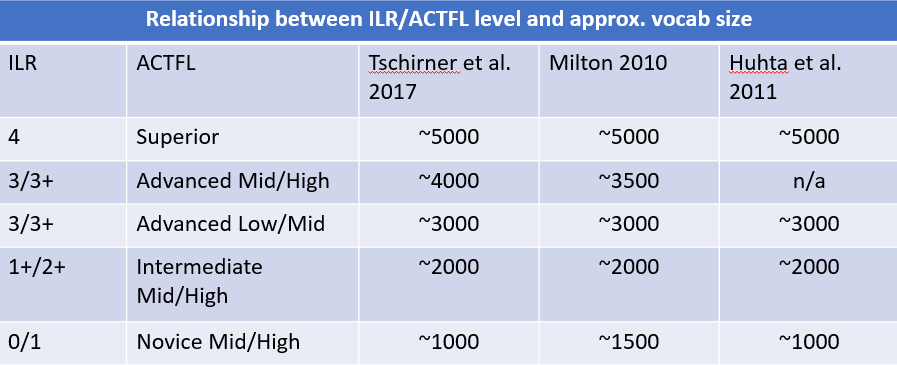Vocab vs. grammar: where to begin? Posted by meaghan on May 5, 2021 in For Learners
You have limited time to study your target language. How should you spend it? ⌛️
Start with vocabulary. We don’t just mean memorize a big list of words.
Read on to find out what we mean, or join us Wednesday, May 12 at 2pm EDT to discuss why vocab is crucial no matter your language goals, and how the CL-150 can help.
How is vocab related to proficiency?
We don’t underestimate the importance of grammar, automaticity, cultural fit, etc. but studies1,2,3 have shown that vocabulary size is by far the single most significant indicator of proficiency.
Data consistently show that progressively higher vocabulary sizes are associated with progressively higher proficiency levels4.
Why focus on vocabulary?
?️Vocab “chunks” help you produce the language more fluently.
Did you know your brain processes languages using two different memory systems? Declarative memory learns facts: words, phrases, grammar rules, culture background, etc. Procedural memory learns skills.
Much of what was originally thought to be processed by the procedural memory is actually declarative. For example, an expression like “I do not know” was traditionally thought to be an exercise in grammar—conjugating “know”, negating with “not”, etc. But this is actually processed declaratively as a single “chunk”. The more of these “chunks” you know, the less time you need to process and produce fluent speech.
Learners with large vocabularies can draw from these pre-constructed chunks, stringing them together into longer, more “native-like” sentences when speaking or writing.
?Vocabulary also improves receptive language skills (listening and reading).
Have you ever been listening to someone and got stuck on a single word, only to miss the next 30 seconds of the conversation.
Or you’re reading an article but you’re blanking on a few key words, turning a comprehension exercise into more of a madlib.
Vocabulary can plug those holes, making it easier to listen or read in the target language.
It also frees up your brain to pick up on other aspects of the language that are important for fluency: cultural references, proper pronunciation, and application of grammar patterns.
?Vocabulary actually helps you master different grammatical functions!
When you think of grammar you probably think of conjugating verbs and the like. A sufficiently large and carefully curated vocabulary supports learning those kinds of grammar rules5 and becomes the foundation on which grammar rules can be applied in new and imaginative ways6.
We challenge you to come up with a sentence in the past perfect tense without using any nouns, adjectives, or objects.
Vocab and grammar are also tightly linked in terms of semantics and pragmatics. These two constraints of grammar are learned through vocabulary and fully processing the meaning of words. Semantics has to do with the actual definition of a word or text. Pragmatics refers to how words are used in a practical sense, or in context.
For example, if someone said to you “could you crack the window?” semantically you know that “to crack” means to break, but pragmatically you know that they want you to open the window.
To understand the sentence, the many meanings of individual vocabulary words and idiomatic expression must be known and carefully studied.
So, where does grammar fit in?
Communicating is ultimately about receiving and sharing ideas. You don’t need to be native-like to express an idea successfully. Need medical assistance? The single word “hospital” or “doctor” will likely get you what you need.
But for language professionals using the language for serious purposes, grammar is a must.
As you’re learning vocabulary chunks, start looking for grammar patterns! That’s actually how you learned grammar in your native language, by seeing it in context and deducing the grammar rules.
Then you can apply those rules and patterns in the classroom and in conversations with colleagues.
Not convinced about a vocab-first approach? Join us Wednesday, May 12 at 2pm EDT to discuss why vocab matters more than you think, and how the CL-150 supports building and maintaining your vocabulary.
1 Alderson, J.C. (2005). Diagnosing foreign language proficiency. London: Continuum.
2 Laufer, B. (1992). How much lexis is necessary for reading comprehension? In H. Bejoint & P. Arnaud (Eds.), Vocabulary and applied linguistics (pp. 126–132). London: Macmillan.
3 Stæhr, L. S. (2008). Vocabulary size and the skills of listening, reading and writing. Language Learning Journal, 36(2), 139-152.
4 Milton, J. (2010) Measuring the contribution of vocabulary knowledge to proficiency in the four skills.
5 Nation, I.S.P. (2001) Learning Vocabulary in Another Language, 336.
6 Lewis, M. (2002) Implementing the Lexical Approach: Putting Theory into Practice.



